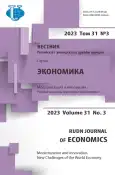Foreign trade cooperation between Tajikistan and China: Assessment of the current state and prospects
- Authors: Qalandarshoev G.A.1
-
Affiliations:
- RUDN University
- Issue: Vol 31, No 3 (2023): MODERNIZATION AND INNOVATION. NEW CHALLENGES OF THE WORLD ECONOMY
- Pages: 431-447
- Section: INTERNATIONAL TRADE IN THE CONDITIONS OF GLOBALIZATION
- URL: https://journal-vniispk.ru/2313-2329/article/view/324314
- DOI: https://doi.org/10.22363/2313-2329-2023-31-3-431-447
- EDN: https://elibrary.ru/PRGVDW
- ID: 324314
Cite item
Full Text
Abstract
Research deals with the issues of trade cooperation between Tajikistan and China. In order to determine the place of China in the foreign trade turnover of Tajikistan, a general statistical analysis of trade cooperation between two countries is given. Changes in the dynamics and structure of the Tajik-Chinese trade since the first years of trade cooperation are presented and the main reasons for these changes are indicated. Based on the analysis of the export-import operations of two countries over the past few years, the main influencing factors on bilateral trade in goods were identified and the existing shortcomings were indicated. It is noted that, despite the inequality of economic opportunities and potential, China pays special attention to its neighbor and strives to improve trade and economic cooperation. It is shown that China, along with other major powers in the region, has managed to strengthen its position in the developing economy of Tajikistan. The purpose of this research is to analyze trade relations between Tajikistan and China, determine the importance of this cooperation for Tajikistan, identify the influencing factors and existing problems, the solution of which could improve this cooperation in the future. The theoretical basis for this study was the work of Tajik, Russian and other foreign authors on Tajik-Chinese trade cooperation. In conclusion, the ways of increasing Tajikistan’s exports are shown, which in the long term can change the dynamics and structure of Tajikistan’s trade with China and other countries.
About the authors
Gulsher A. Qalandarshoev
RUDN University
Author for correspondence.
Email: gulsheralisher1997@mail.ru
ORCID iD: 0000-0003-1983-6361
PhD student, Department of International Economic Relations, Faculty of Economics
6 Miklukho-Maklaya St, Moscow, 117198, Russian FederationReferences
- Alimov, R. (2011). Good-neighbour relations as a factor of common development. Scientificanalytical journal “Obozrevatel’ — Observer”, 9(260), 86–95. (In Russ.).
- Alimov, R.K. (2014). Strategic partnership of Tajikistan (RT) and China (PRC): international political, economic and humanitarian dimensions [dissertation]. Moscow. (In Russ.).
- Asrorzoda, U.S. (2019). Perspective directions of integration ties between Central Asia and PRC. Bulletin of the Tajik National University. Economic and social sciences, 7, 48–52. (In Russ.).
- Dodikhudoev, Kh., & Niyatbekov, V. (2009). The Chinese vector in Tajikistan’s policy. Central Asia and the Caucasus, 2(62), 138–151. (In Russ.).
- Ionova, E. (2014). Growth of Chinese influence in Tajikistan. Russia and New States of Eurasia, 1(22), 82–88. (In Russ.).
- Ionova, E. (2019). Tajikistan in the Orbit of Interests of China and Russia. Russia and New States if Eurasia, III (XLIV), 107–120. (In Russ.).
- Khaydarova, M.N. (2018). Modern economic relations of Tajikistan and China, their structure and prospects. Bulletin of the university (Russian-Tajik (Slavonic) university), 3(63), 116–126. (In Russ.).
- Khushvakhtzoda, Q.Kh., & Asrorzoda, U.S. (2020). The processes of trade and economic cooperation between the countries of Central Asia and the PRC. Bulletin of the Tajik National University. Economic and social sciences, 9, 157–165. (In Tajik).
- Mahmadov, P., & Sharifi, A. (2017). Tajikistan and China: strategic cooperation in the modern period. Proceedings of the Institute of Philosophy, Political science and Law after A. Bahovaddinov of the Academy of Sciences of the Republic of Tajikistan, 3, 90–94. (In Tajik).
- Mirzoev, N.M., & Mirzoev, H.T. (2019). New horizons of strategic cooperation between the Republic of Tajikistan and the People’s Republic of China. Herald of the Pedagogocal university, 6(83), 222–228. (In Russ.).
- Popov, D.S. (2019). Tajikistan-China current bilateral relations: issues and prospects. National Strategy Issues, 4(55), 87–105. (In Russ.).
- Sharifzoda, A. & Qosimi, Z. Emomali Rahmon — Silk road: Tajikistan and China. Dushanbe.
- Umarov, Kh. (2013). Comparative analysis of Tajikistan’s trade and economic relations with Russia and China. Central Asia and the Caucasus, 16(3), 145–156. (In Russ.).
- Van, Yazce, Lyu, Syan’yuo, & Ashurov, I.S. (2018). Tajikistan and China: the problems of trade and the ways to overcome them. Bulletin of Bokhtar State University named after Nosisri Khusrav. Humanitarian and economic sciences, 1–3(55), 206–211. (In Russ.).
- Vasilev, L.E. (2016). On the current status of political and economic cooperation between China and Central Asian states. China in World and Regional Politics (History and Modernity), 21(21), 174–188. (In Russ.).
Supplementary files









